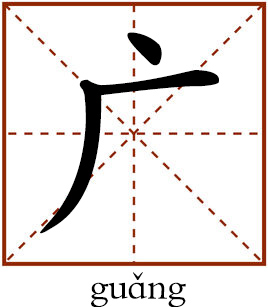Expand

This character is used frequently. When it is used as an adjective, it means “wide, far-reaching or numerous.” When used as a verb, it means “to expand or spread.”
广开兮天门
guǎng kāi xī tiān mén
This term, which means that the gate of Heaven is open widely, is derived from a poem of Jiu Ge (Nine Songs) by Qu Yuan (c. 340–278 BCE). Jiu Ge is a poetry anthology inspired by the folk songs along the Yangtze River.
The poem “Da Si Ming” (“Song for Fate the Great”) is comprised of a dialogue between Fate the Great and Witch as Usherette and their monologues. Fate the Great, a god in charge of life and death, starts this poem with his monologue—“Be the Gate of Heavens open wide,/ On the holy clouds I am to ride./ Let the gales, my vanguards, th’ way prepare,/ Let the drizzles of the dust take care” (trans. Zhuo Zhenying). These words reveal that he is dignified and solemnity incarnate. Then Witch as Usherette echoes, “You have come spiraling into view;/ Crossing Mount Kongsang I’ll you pursue.” It is perceived that the witch has a crush on Fate the Great and the rest of the poem shows her meekly doing as she is told. However, Fate the Great glories in his superiority over everything, overlooking this untold affection. The witch murmurs “I pluck the holy hemp’s gem-like bloom/ For th’ Deity who would away zoom./ Senility slowly creeping near,/ That I’d lose favor with Fate I fear.” This portrays the witch’s respect for Fate the Great as well as her sorrow for the increasing alienation between them as time goes by. When Fate the Great is about to leave, the witch says wistfully, “Laurel in hand I can’t bear to part;/ I gaze upward with a sadden’d heart./ ‘Tis of no use, however, just to weep:/ Morals I must ever since duly keep!/ By our own stars we can’t but abide;/ To meet or to part who can decide?”
The witch seems resilient and cheerful again. However, a further study reflects a sense of helplessness and frustration for an unsuccessful pursuit, which was believed to be the true feeling of Qu Yuan, who devoted himself to his motherland but was estranged from the throne through the malice of his rivals. He eventually drowned himself in despair in the Miluo River.
edited by REN GUANHONG

 PRINT
PRINT CLOSE
CLOSE